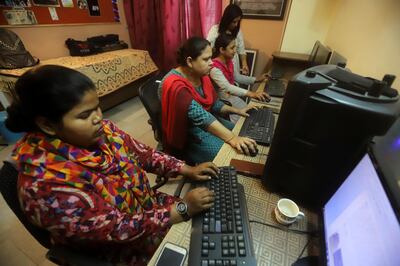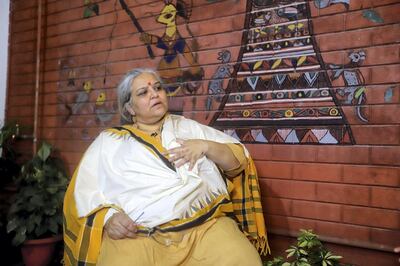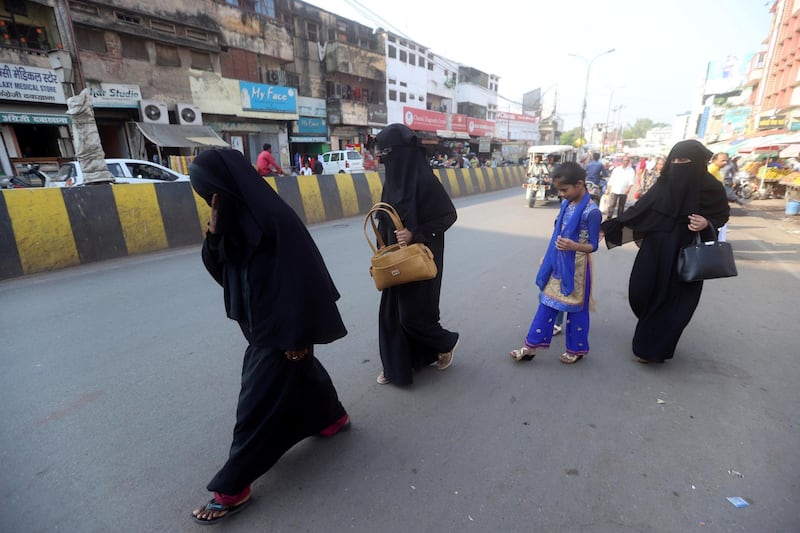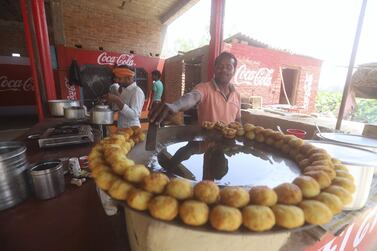India’s Muslim minority say they dread another five years of rule by Prime Minister Narendra Modi's Bharatiya Janata Party, which has been forecast to win the continuing election with a slim majority.
In Lucknow, capital of the northern state of Uttar Pradesh where a large percentage of India's Muslims live, residents say the BJP's Hindu nationalist speech has created an atmosphere of fear and alienation among minorities.
Muslims, India's largest minority who make up more than 13 per cent of its 1.3 billion people, say they are called unpatriotic, outsiders and traitors if they criticise the government.
Posts questioning their loyalty to India and insinuating that they do not belong are widely shared on WhatsApp.
“If you are Muslim, it’s as if you are under a question mark and it is humiliating,” said Askari Naqvi, a singer and stage performer.
"There is a hysteria and aggression if you say anything about the current regime and people have become more aggressive about their support for the BJP.
“Even old friends I have grown up with share WhatsApp messages spreading propaganda that Muslims are descendants of Babar [India’s first Mughal emperor].
"But in the evening, the same friend will call and ask how I am. I get confused about how to react.
"This is because I know even if he has forwarded a hate message, he will be there for me when I need his help.”
Since the BJP came to power in 2014, there has been an increase in mob killings of people accused of eating beef or slaughtering cows, an animal many Hindus consider sacred.
At least 44 people have been killed so far, most of them Muslim. While slaughtering cattle is banned in several Indian states, eating beef is not illegal.
Naqvi has added a contemporary message on the futility of violence when he stages performances of Dastangoi, a storytelling form based on medieval Urdu-language tales.
“I speak for a diverse India," he said. "I say that whether someone dies in the name of the cow, in a riot or when a soldier dies in a war, the family feels the pain.
"Only the widow and children know what it is like to experience that trauma."
Naqvi, 33, a former lawyer who set aside a thriving practice to revive the art form that retells stories, picks his words carefully, without identifying a political party or mentioning religion.
He said all he asked of his audience was to put themselves in the shoes of the family of a victim of violence.
“I don’t say the BJP is responsible because honestly I don’t know if someone may attack me for what I say," Naqvi said.
"I have become very careful about where, when and to whom I speak. But I can fight back using a cultural narrative.".
In another area of Lucknow, Aisha Khatoon teaches photography and video editing to young Muslim women as part of the Bebaak collective, a grassroots movement of female activists.
Ms Khatoon believed the BJP’s assurance of progress for all when it swept to power five years ago, but is deeply disappointed that the government has failed to protect the minority community.
“What we feel now is fear," she said. "In this 2019 election I’m hoping there will be a change so this atmosphere of fear will end.
“The closeness I felt with my friends has disappeared. They know that mob lynching is wrong but they still support Modi.
"We are careful about what to say and what not to say. Our friendship has not broken down but there is a distance between us.
"The BJP promised progress for all, so shouldn’t they think of all communities? If you think of only one community, how can the country move ahead?”
The BJP says it does not discriminate between citizens based on religion and is against appeasement of any community.
Ms Khatoon's students are encouraged to think for themselves, question the status quo and talk to family and friends about exercising their franchise.
“We need to vote for change, for a transformation. Any party can come to power but it must take all communities together,” she said.

Muslim worries about being marginalised have been aggravated by the revision of their role in Indian history in school textbooks and the renaming of cities with Muslim names.
In Uttar Pradesh, Allahabad was renamed Prayagraj by the state's BJP government, which said it restored the city’s identity as a major Hindu pilgrimage centre.
Faizabad, a district in the state, was renamed Ayodhya – the place where Hindus believe the god Ram was born.
Madhavi Kukreja, an activist who works with the lower castes, or Dalits, and Muslim women in the villages of northern India, warned that insecurity would divide the country.
“Many people in Lucknow don’t carry non-vegetarian food on a train any more in case someone suspects them of eating beef,” said Ms Kukreja, who runs a crafts store and runs a popular festival of traditional arts and drama.
"This lynching culture is, for me, the primary cause of fear if the government gets back in power.
“It’s not one thing – it’s not textbooks, renaming, lynching. It’s all the issues combined being used to demonise the Muslim, to demonise the Muslim neighbour.
"If people vote with a communal card, I don’t know if there is any going back.
"Identities are so beautiful but identities have become polarised. If we don’t speak up, we could lose everything we love.”

Naqvi said it would take years to mend rifts and clear the suspicions that have been created.
“We must learn to live in this atmosphere because if you don’t learn to live within these rules, you will not survive,” he said.
“I don’t feel depressed any more. I have surrendered to it.
"It was hurtful to think that some people do not accept that Hindustani Muslims have always lived here; that we belong and have nothing to do with invaders.
"It’s immaterial to me now which political party comes in. The divisions that have been created will take a generation to erase.”







